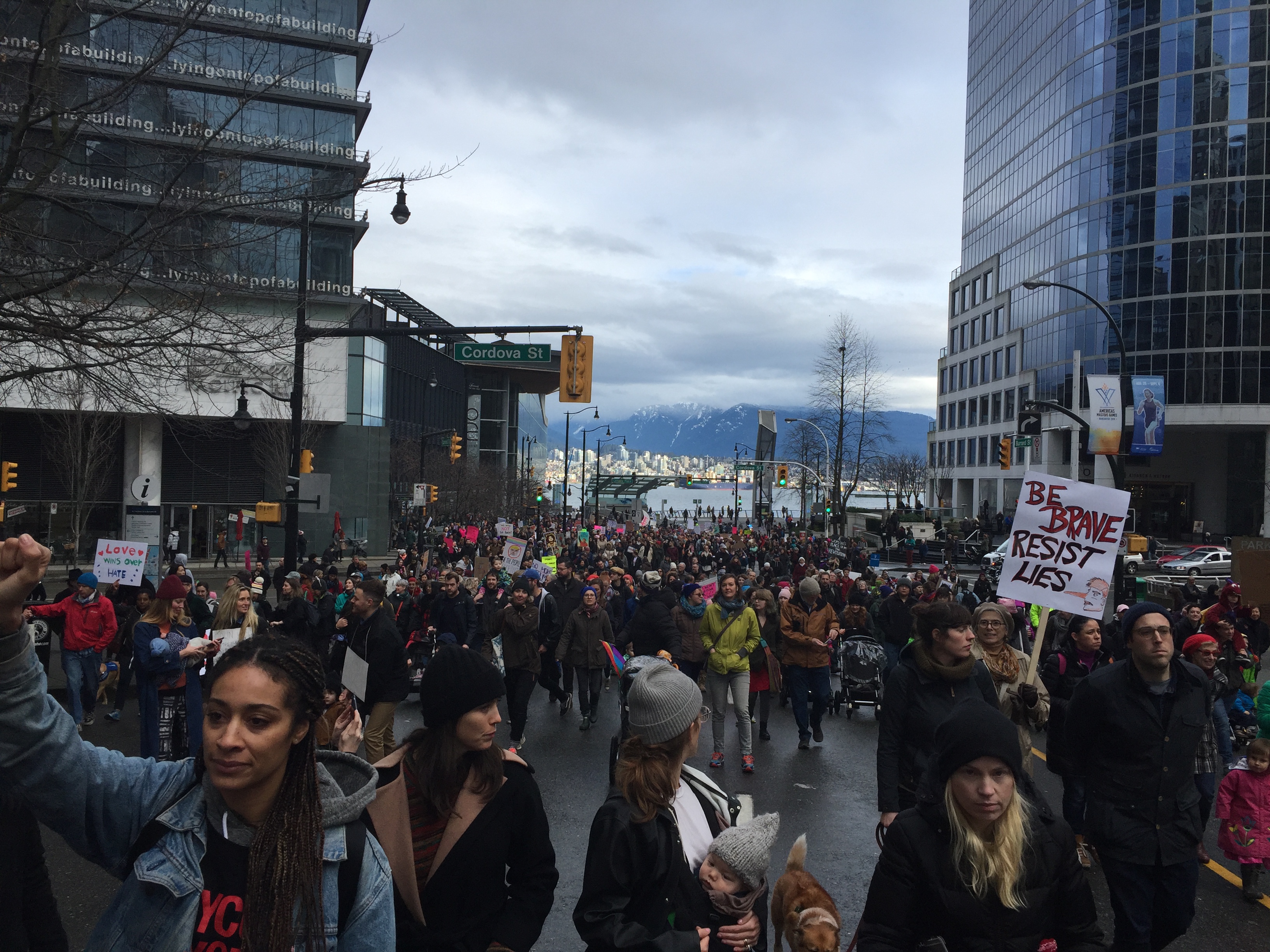Women’s March Vancouver
On the morning of January 21, 2017 an estimated 15,000 people gathered at Vancouver’s Jack Poole Plaza to march through the streets of the downtown core as part of the Women’s March Vancouver. Within the United States there were 679 marches and worldwide there were another 137 marches in countries ranging from Antarctica, Iraq and Kenya among others. Rallies around the world in support of the Women’s March on Washington, D.C. to show solidarity for women’s rights and human rights the day after Donald Trump’s inauguration as U.S. president.
In anticipation for the event many souvenirs and artifacts were sold to commemorate the “Women’s March on Washington” ranging from t-shirts, pins, hats, posters, pussy hats etc. worldwide. These ideas being brought forth within 816 rallies gave way to opportunists whom could be profiting from this collective gathering. These products and the lives they impacted along the way to their destination should be questioned, a real need to trace back to the people who’ve made them. These products may not uphold the ideals and morals of the people using them to demonstrate their support of women across the globe and so the globalization of the Women’s March on Washington stands to hurt the very marginalized people it aims to defend through the commodification of their ideals.
Another question worth asking is who legitimizes the circulation of these ideas and does the rhetoric being proposed reflect the hearts and minds of all of those it claims to represent? The demographic of the attendees should be examined because the people who could spend their day marching in support of women’s rights may have represented only a small portion of the backgrounds of people who need to be honoured. Intersectional feminism seeks to include perspectives from every class, race, gender, sexual orientation and physical challenges. It’s worth noting that the organizers of Women’s March Vancouver excluded Black Lives Matter Vancouver or any other Black or Trans organizers or speakers on January 21st march. It’s crucial to ensure that as many perspectives, voices and representatives of an intersectional community be showcased in major events like these.
As mentioned In the Shadows of Stonewall: Examining Gay Transnational Politics and Diasporic Delemma, “It would be dangerous to suggest a convergence in homosexual lifestyles across the world- into one true universal gayness.” (Manalansan, Martin 1995)I feel as though parallels can be drawn to caution us from unifying the female experience to one universal framework or set of challenges in order to unify people to show up for the Women’s March on Washington. We should recognize the possibility of getting caught up in the idea of winning momentum through simply gathering a large number of people in the streets and participating in politics that separates rather than unites. It is the responsibility of all of those in support of the Women’s March on Washington to ensure inclusion, especially for ideas that permeate the world on such an impactful and important day.
After reading The British Colonial Origins of Anti-Gay Laws and learning that former British colonies are much more likely to have laws that criminalize homosexual conduct I began to question the Western views of women in other countries and how their viewed oppression of their own country could have been linked through colonialism. Western women seeing themselves as a saviour or guiding light to salvation and freedom for third-world women should recognize that the laws and hierarchies of social structure could have easily been traced back to British rule. The ways in which ideas, rallies, social justice and movements transport themselves across the world is not easily delineated. The impacts of the people participating and the acknowledgement of those who are not should be a greater part of the conversation to ensure an event like the Women’s March on Washington is not filtered down into a singular perspective or alienating marginalized groups that it claims to represent.
https://en.wikipedia.org/wiki/List_of_2017_Women%27s_March_locations#Worldwide
Manalansan, Martin. (1995). In the shadows of Stonewall: examining gay transnational politics and the diasporic dilemma. GLQ, 2(4): 425-438
Han, Enze and O’Mahoney, Joseph. (2014). The British colonial origins of anti-gay laws. The Washington Post, October 30: https://www.washingtonpost.com/news/monkey-cage/wp/2014/10/30/the-british-colonial-origins-of-anti-gay-laws/?utm_term=.99b68d0b1840
